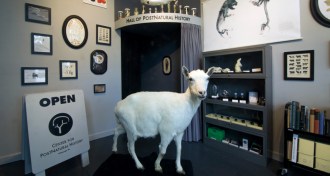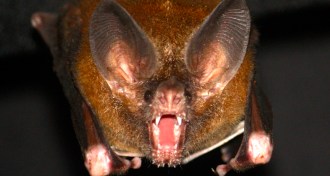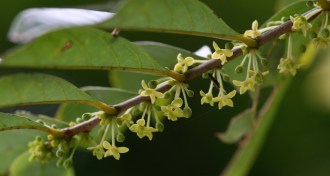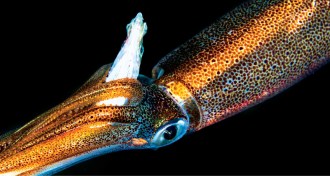Life
Sign up for our newsletter
We summarize the week's scientific breakthroughs every Thursday.
-
 Science & Society
Science & SocietyHumans’ living creations put on display
The Center for PostNatural History, a museum that opened in 2012, features Freckles and other organisms altered by humans.
-
 Animals
AnimalsFrog-eating bats trust self first when hunting
The mammals listen to cues from fellow bats when their own resources fail.
By Science News -
 Plants
PlantsSingle-sex flowers release his, hers fragrances
Growing on the same tree, male blooms smell different from female blooms in certain tropical plant species.
By Susan Milius -
 Genetics
GeneticsDog clone genome nearly identical to donor DNA
The genetic material of Snuppy and of his donor, Tai, is nearly identical.
-
 Earth
EarthTrees mark the spot of buried gold
Tiny bits of the precious metal in eucalyptus leaves indicate treasure lurks belowground.
By Beth Mole -
 Environment
EnvironmentFeedback
Readers respond to "Solving soot," trade-offs of horn size for male Soay sheep and the huge galactic explosion story from 50 years ago.
By Science News -
 Life
LifeGood news for giant pandas
The animal’s immune system has higher than expected genetic diversity, which could lead to better breeding programs.
-
 Genetics
GeneticsGroovy surface changes cells’ state
Physical cues may be as important as chemical ones when trying to revert mature cells to stem-cell-like ones.
-
 Life
LifeLab-grown hair offers early hope
Specific growth conditions could be the key to treating receding hairlines and bald spots, a new study suggests.
-
 Health & Medicine
Health & MedicineSeek Meningitis Vaccine
Excerpt from the November 9, 1963, issue of SCIENCE NEWS LETTER.
By Science News -
 Animals
AnimalsThe colorful lives of squid
Your calamari, it turns out, may have come from a temporary transvestite with rainbows in its armpits.
By Susan Milius -
 Genetics
GeneticsFamily takes on progeria in ‘Life According to Sam’
A new documentary portrays an extraordinary search for a cure spurred by a teen with the premature aging disease.